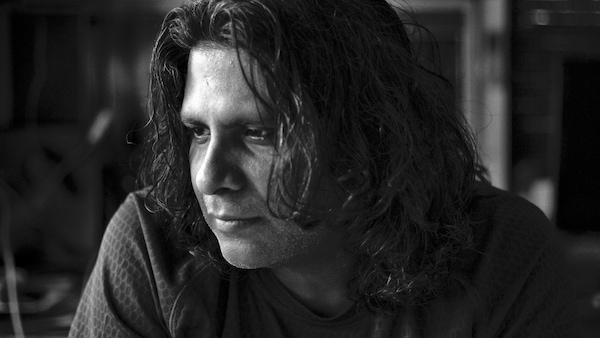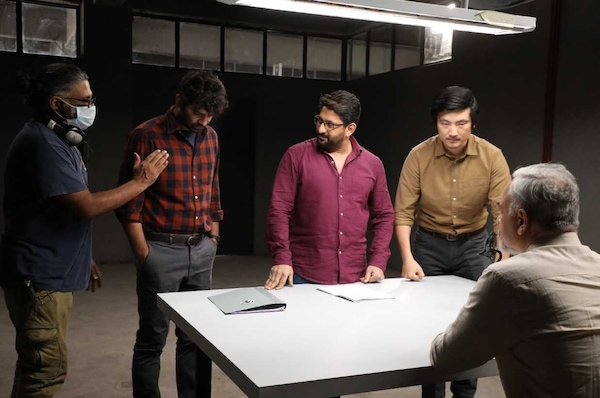Exclusive | Asur director Oni Sen: ‘While mythology and religion can merge at some point, they’re very different’
Asur director Oni Sen opens up about creating a mythological thriller in the current socio-political climate in the country, scrutiny and self-censorship for films, as well as the future of OTTs...

Last Updated: 11.28 PM, Aug 08, 2023
Director Oni Sen is credited with creating India’s first mythological thriller web series with Asur. Led by Arshad Warsi, Barun Sobti, and Anupriya Goenka, among others, the first season of the show became a sleeper hit and the second season, released in June this year, continues to receive the love and appreciation of viewers.
In an exclusive conversation with OTTplay, Sen opened up about the challenges of making a mythological thriller layered with religious subtexts in a country like India, self-censorship by makers, excessive scrutiny of films and the future of OTTs. Edited excerpts:
Q. Given the current socio-political climate in the country, how easy or difficult it is for a filmmaker, to create a show like Asur, which relies so heavily on religion and mythology? Considering how things are today where it seems like people are just waiting to be offended by something or the other, what are the challenges when it comes to the writing and filming process? Is there any apprehension at the back of your head?
Let's face it, if you're working in India, and creating something based on mythology and religion, and trust me, while they can merge at some point, they are actually different. Yes, you are opening yourself up to interpretation. But that doesn't mean that always things will go wrong. Fortunately, at least in our journey, you see, if you really analyze Asur season one and season two, there is nothing about religion. It is actually only about Indian mythology. And it hovers around the story of Kali and Kalki. It is basically the delusion of a man who believes that he is an incarnation of Kali. And yes, there are various references to little stories from the Mahabharat, from stories about Shiva and things like that, but those are again pulled in only as a reference to Indian mythology.
So, in that way, we were actually very safe. And we had no other intention and we played it exactly in the realm of what we wanted to do. It was well-researched and there was a team that made sure that was nothing wrong going up because that was not the intent at all. But at the same time, in a broader picture, given the way our country is, our emotions run high and stuff like that. I think it's a bit of a double-edged sword if you do venture into anything to do with religion. Mythology – not so much, but yeah, I think you just need to be careful. And I always believe that it's not so difficult to be in a position where you would not hurt somebody’s sentiment. Somewhere down the line, I think an inner voice tells you whether you're cool or you're not cool. I think you can follow that.
Q. So, do you feel that there should be a certain amount of self-censorship that the makers should exercise when dealing with sensitive topics like these? And if yes, don't you think that it is kind of a compromise in the freedom of expression of a creator?
A. Well, I won't say self-censorship in a way that you hold yourself back. Self-censorship in a way that (answers) - What am I trying to say? What is the story? Eventually, all of us want to tell stories, right? So, this is my story, and is this needed for my story? And if it's needed for my story, then it's fine. If it's not needed for my story, then am I putting it in just for the sensation part of it? I think those are the questions if you ask yourself as a maker or a writer, you would pretty much know the answer. However, despite doing that, there might be somebody who might be (offended), that's a risk one needs to take or one would have to take if you're dealing with stories which have religion or mythology in them.
Q.You would be aware of the entire furore that took place after Adipurush release, and I read somewhere that you haven't watched the film yet. And now, Akshay Kumar is coming up with OMG 2. After the release of its poster and teaser there was a similar controversy and the Censor Board put it on hold for quite some time. Reports said that they're taking some pre-emptive measures just to ensure that there's nothing that offends the public sentiments. But don't you think that it's kind of impossible to keep everybody happy all the time, and so much of scrutiny regarding a film is not justified? I mean, that's my opinion. I'd like to know your thoughts on that.
Yeah, I think I think it is (not justified). I would say it's unfortunate, that as makers or writers, people have to worry so much about it. I hope that at some point, soon one can find a balance. Trust yourself with honesty, and yet not worry about being misunderstood, because it is your opinion and your opinion only. So, I think that we haven't managed to get there as yet. So hopefully, we will get there someday. Or close to it.
Q. Where do you see the OTT space heading with such a lot of influx of content across multiple platforms? While it's a great thing because it gives the viewers a great many options, do you also feel that in the midst of the quantity, the quality somewhere, dilutes? We don't see the kind of great shows and direct-to-OTT movies, as we used to probably even a couple of years back.
I feel it will take a little time. If I give you a parallel example, about 15 years back, before this entire digital thing (OTT) hit cinema, before that, cinema was always for the privileged. By privileged, I don't mean privileged, as in socially. There's a cinema privilege and cinema underprivilege, right? Just because you had an idea, you couldn't go and make a film, because you have to get a camera and you have to shoot and edit and all those things. Slowly with this digital thing, when it started, it came to a point where anybody can make a film. You have an idea; you can make a film. You want to tell a story, you can make a film – doesn't matter (if it’s a) good, bad, ugly, whatever story. So, there was a certain kind of democratization of cinema that happened.
Now, as a result of it, if you remember, during that time, the first influx was a whole bunch of garbage. Besides the regular interesting work, people started experimenting. Whether it's an experiment of different kinds of cinema movement, whether it's dogma, whether it's various kinds of movement, which started going on. So, there were a whole lot of personal experiments that started. So, the volume was huge and therefore, the good material started getting hidden deep inside for us to find. But now, that has ebbed out a little bit. Everything has got a little pocket platform here, there. So, that entire thing of – I have a story and I want to tell a story – is not difficult anymore. It's become really beautiful; anybody can tell a story.

I feel the same thing will happen to OTT as well. It's just that because it's new and people need the content, and therefore, there are people being commissioned, to fulfill (the demand), products are being made. Sometimes you're looking at quality, sometimes you're not looking at quality. There are various things at play. I think even the entire commercialization aspect of it, is something which I'm sure people are trying to figure out because it's not so easy. That game of you go to a theatre, you pay X amount of money and buy a ticket, from the ticket X amount goes to the theatre owner, Y amount goes to the producer – that entire dynamic is very different here. So, I think right now, we are in an entire little cauldron, trying to get our life together, but I think it's positive, it'll get there. We were already getting a lot of amazing content. We are still getting some and we'll keep getting more once it stabilizes a little bit.

